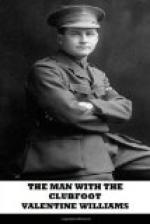“Well, to make a long story short, the interpreter made a deal with the Huns, and this Dr. Semlin was sent to England from Washington, where he had been working for Bernstorff, to fetch the letter at the address in London indicated by the interpreter. In the meantime, we had got after the interpreter, who, like Schulte, had been in the espionage business all his life, and he was arrested.
“We know what Semlin found when he reached London. The wily interpreter had sliced the letter in two, so as to make sure of his money, meaning, no doubt, to hand over the other portion as soon as the price had been paid. But by the time Semlin got to London the interpreter was jugged and Semlin had to report that he had only got half the letter. The rest you know ... how Grundt was sent for, how he came to this country and retrieved the other portion. Don’t ask me how he set about it: I don’t know, and we never found out even where the interpreter deposited the second half or how Grundt discovered its hiding-place. But he executed his mission and got clear away with the goods. The rest of the tale you know better than I do!”
“But Clubfoot,” I asked, “who is he?”
“There are many who have asked that question,” Red Tabs replied gravely, “and some have not waited long for their answer. The man was known by name and reputation to very few, by sight to even fewer, yet I doubt if any man of his time wielded greater power in secret than he. Officially, he was nothing, he didn’t exist; but in the dark places, where his ways were laid, he watched and plotted and spied for his master, the tool of the Imperial spite as he was the instrument of the Imperial vengeance.
“A man like the Kaiser,” my friend continued, “monarch though he is, has many enemies naturally, and makes many more. Head of the Army, head of the Navy, head of the Church, head of the State—undisputed, autocratic head—he is confronted at every turn by personal issues woven and intertwined with political questions. It was in this sphere, where the personal is grafted on the political, that Clubfoot reigned supreme ... here and in another sphere, where German William is not only monarch, but also a very ordinary man.
“There are phases in every man’s life, Okewood, which hardly bear the light of day. In an autocracy, however, such phases are generally inextricably entangled with political questions. It was in these dark places that Clubfoot flourished ... he and his men ... ‘the G gang’ we called them, from the letter ‘G’ (signifying Garde or Guard) on their secret-service badges.
“Clubfoot was answerable to no one save to the Emperor alone. His work was of so delicate, so confidential a nature, that he rendered an account of his services only to his Imperial master. There was none to stay his hand, to check him in his courses, save only this neurotic, capricious cripple who is always open to flattery....”




